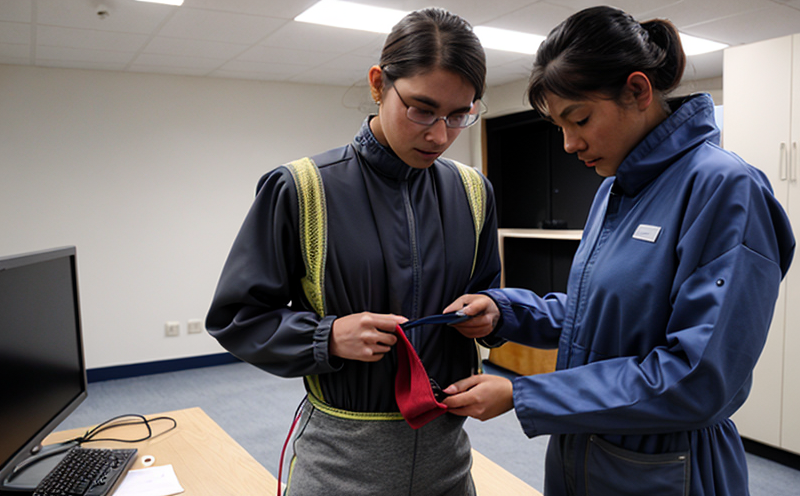BS 5852 Ignitability testing of upholstered car seat fabrics
The BS 5852 standard is a critical benchmark in fire safety assessments for upholstery materials, especially those used in automotive interiors. This test evaluates the ignition propensity and flame spread characteristics of fabrics used in upholstered components like car seats. The primary objective is to ensure that these materials meet stringent safety requirements, thereby protecting passengers from potential fire hazards.
The testing procedure involves exposing a fabric specimen under controlled conditions to an open flame for 60 seconds, followed by observation over a subsequent five-minute period. During this time, the tester monitors and records any flaming or smoldering behavior of the material. The results provide insights into the flammability properties of the textile, which are crucial for product safety.
To achieve accurate and consistent test results, it is essential to adhere strictly to the prescribed parameters outlined in the BS 5852 standard. This includes selecting appropriate specimen sizes, ensuring specimens are free from contamination or defects that could skew the test outcome, and maintaining uniform lighting conditions during the observation period. The testing apparatus must also be calibrated regularly to ensure precision.
In addition to flame propagation tests, the BS 5852 protocol encompasses other aspects such as residual flaming after removal of the ignition source, self-extinguishing capability, and heat release rates (HRR). These additional parameters offer a comprehensive evaluation of the material’s flammability characteristics. Understanding these nuances is vital for manufacturers aiming to comply with safety regulations while enhancing product performance.
The standard applies not only to automotive upholstery but also extends to other industries where fire safety is paramount, such as furniture manufacturing and public transportation. By adhering to this stringent testing methodology, companies can ensure that their products meet the highest safety standards, thereby safeguarding end-users from potential risks associated with flammable materials.
The implementation of BS 5852 ignitability testing contributes significantly to reducing fire-related incidents in vehicles, enhancing occupant safety. This is particularly important given the increasing use of advanced materials in automotive interiors that may have different flammability characteristics compared to traditional upholstery fabrics.
For manufacturers and suppliers involved in these sectors, compliance with BS 5852 ignitability testing ensures their products meet regulatory requirements and industry expectations. It also helps maintain a reputation for quality and safety, which is essential for market competitiveness.
Benefits
The implementation of BS 5852 ignitability testing offers numerous advantages to manufacturers in the automotive sector:
- Ensures compliance with international safety standards.
- Enhances product quality and reliability.
- Reduces risks associated with fire hazards in vehicles.
- Improves brand reputation and consumer trust.
- Safeguards occupant safety during accidents or malfunctions.
- Supports regulatory compliance, avoiding potential fines and legal issues.
- Facilitates market access to regions with stringent fire safety regulations.
By integrating BS 5852 testing into their quality assurance processes, companies can demonstrate a commitment to safety and sustainability, ultimately fostering long-term success in the competitive automotive industry.
Industry Applications
| Application | Description |
|---|---|
| Automotive Interior | Incorporation of fire-resistant upholstery in car seats, headrests, and other interior components. |
| Furniture Manufacturing | Development of flame-retardant fabrics for residential and commercial furniture. |
| Public Transportation | Use of ignitability-tested materials in buses, trains, and other public transport vehicles. |
| Aerospace Industry | Incorporation of fire-resistant seating and interior components for aircraft interiors. |
| Marine Environment | Manufacture of flame-retardant seating and upholstery materials for marine vessels. |
| Medical Equipment | Production of ignitability-tested fabrics for medical equipment where fire safety is critical. |
The BS 5852 test results are particularly valuable in these sectors, as they provide a standardized method to assess the flammability properties of textiles used. This ensures that all products undergo rigorous evaluation, leading to safer environments for end-users.
Eurolab Advantages
At Eurolab, our commitment to excellence in textile testing is reflected in the comprehensive services we offer. Our state-of-the-art facilities and experienced technical staff ensure that every test conducted meets the highest standards of accuracy and reliability.
- Advanced instrumentation for precise measurement and analysis.
- Experienced technicians with extensive knowledge in textile testing.
- Comprehensive reporting services tailored to client needs.
- Access to the latest industry standards and best practices.
- Compliance with international regulations, including BS 5852.
- Support for research and development initiatives related to textile testing.
- Customized solutions for unique client requirements.
Our services are designed to help manufacturers and suppliers meet stringent fire safety standards, ensuring that their products are safe and reliable. By partnering with Eurolab, clients can benefit from our expertise and resources, ultimately enhancing product quality and market competitiveness.





